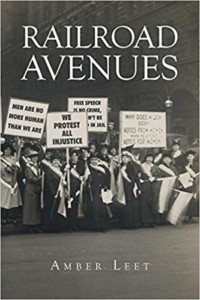Title: Railroad Avenues
Author: Amber Leet
Publisher: Page Publishing, Inc.
ISBN: 978-1-64082-378-5
Pages: 106
Genre: Historical Fiction
Reviewed By: Susan Brown
Pacific Book Review
In 1920, the 19th Amendment to the Constitution was ratified, giving all women in America the right to vote. The hard-fought battle took close to 100 years of marching, rallying and fighting to secure this liberty. Railroad Avenues is a fictionally accurate novel which brings the issue to life throughout the course of six months in a small town in Nebraska, three years before the amendment was ratified.
It’s the story of many women, but in particular Pearl, a 17-year-old suffragette, who has to keep her identity hidden from the other women in the local cohort. Why? Because her father is a judge and adamantly opposed to the suffrage movement. He makes statements such as, “You women must work simple cares, you aren’t created for complex affairs. Your silence is your moral right.” Her father’s inflammatory assertions do not dissuade Pearl from emphatically arguing that women, not only deserve, but are entitled to vote; to have their voices heard that they are much more than a “mother and a spouse.”
But in public she must tread carefully, to insure her identity not be found out. It would not sit well with her father to have her stand before him in court, arguing for women’s rights. But that is indeed what happens. Because of her views, she is sent to a detention center with other women involved in the movement. In court, and in detention, she keeps who she is a secret, not wanting to be treated any differently than any other women advocating for the right to vote. But her commitment to the cause is steadfast. As she says, “I feel in my heart it is the right thing to do. I want to help all women bring awareness for mistaken duties men have seen in us. I‘ve noticed anguish in my father‘s eyes, not for stirs of deep pain, but true fear of what happens if we gain rights. My wish is to comfort him and prove to men we‘re able-bodies and remove ill thoughts. I want to help amend our lives.”
This novel aptly captures the repercussions women experienced, post-Civil War, against their efforts to gain equality in voting. It is a tale that highlights the stigma women faced, restricted from taking a step outside the considered norm for women’s roles. “What the collective want is for us to remain veiled in a shroud that’s tame and true,” exclaims one of the other suffragettes.
Author Amber Leet uses an interesting writing style to bring this subject to life. The narrative has a lilting flow to it, since it’s all dialogue that keeps the reader engaged. The characters’ words, each line ending in rhyme, carry the story forward with emphatic fervor. This would make a rousing stage production. In lieu of seeing it on the stage, take time to read parts of it out loud. The characters really come to life.
At the end, Pearl’s father resolves, “It‘s our great role as men to honor women with respect, and to our nation’s creed, include them as a true and equal people.” This message has not lost its importance and is a sentiment as equally vital in the 21st century, for women and men around the world, as it was 100 years ago.


